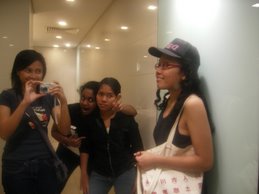Today’s news can be brought about by ordinary individuals like you and me. As defined by Wikipedia (2007), citizen journalism is the act of citizens playing an active role in the process of collecting, reporting, analyzing and disseminating news and information (participatory journalism). Traditionally, news are brought by professional journalists or reporters but with change in technology, comes the introduction of citizen journalism or rather the rise of it. This way, not only are the news more saturated but voices that were once 'unheard' are now projected. Journalists work around a certain parameter. With contributions from ordinary folks like us, stories which journalists are unable to provide become available.
There are many ways citizen have found to make their stories heard.
1) Blogging - a venue where not only bloggers create sensational news but readers can post in fruitful comments.
2) Forum groups, mailing lists
3)Sousveillance - another form of citizen journalism where people in turn become watchdogs and record on the happenings around them, even those of higher authority. (photos and videos)
So what has changed?
The way news are reported have revolutionized, more medium to reach the masses, news are varied and audience have also transformed from being passive to being active.

STOMP!
The rise of the citizen journalist will help us listen. The ability of anyone to make the news will give new voice to people who’ve felt voiceless—and whose words we need to hear. They are showing all of us—citizen, journalist, newsmaker—new ways of talking, of learning (Gillmor, 2004). This is what the Straits Times has invested in. Coming out with a website - Straits Times Online Moblie Print (STOMP), it aims to engage Singaporeans in providing their own news or opinions. With the definition of 'citizen journalism' in mind, STOMP clearly falls under that category.
Cherian George's view are in contrast. He does not consider STOMP to be citizen journalism as it merely responds to the issues asked by the editors. He also believes that the basis of citizen journalism is to do its own agenda-setting and putting the public on top, not on tap (George, 2006). True.
But in my opinion, any form of response or report from the public is still citizen journalism. Unlike the professionals, we need something or someone to trigger us to ponder. Thus, when the editors post out a question or mission, it generates thought from the public. We need to hear from normal people too. Views from the professionals may differ from the public. This results in news being brought out from various perspectives. It's the very basic idea that citizen are allowed to engage in journalism, be it responding to a question or putting out comments, that makes STOMP a form of citizen journalism.
STOMP basically covers all areas of interest. Entertainment, food, fashion and shopping. Maybe politic is not that greatly covered because of its sensitive nature but it could be included so as to make this website more thought provoking. In addition, to make the public more active, editors could give out reward to those who contribute. Like what George has mentioned in his blog, to put the public on top, STOMP can feature the top contributors or give a special mention to those who come out with original stories.
References
George, C. (2006). Singapore:New Media, Politics & the Law. Is STOMP citizen journalism?. Retrieved March 31, 2007 from http://singaporemedia.blogspot.com/2006/07/is-stomp-citizen-journalism.html
Gillmor, D. (2004). We the Media. Grassroots Journalism by the People, for the People. Retrieved March 30, 2007, from http://download.nowis.com/index.cfm?phile=WeTheMedia.html&tipe=text/html
Wikipedia. (2007). Citizen Journalism. Retrieved March 30, 2007 from http://en.wikipedia.org/wiki/Citizen_journalism#Criticisms
